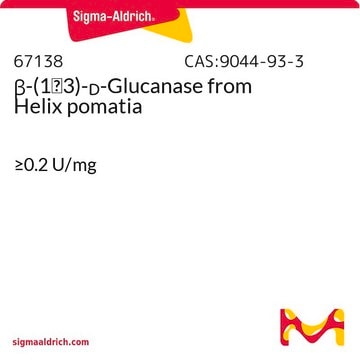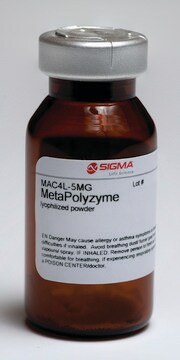L1412
Lysing Enzymes from Trichoderma harzianum
lyophilized powder
Synonym(s):
Glucanex®
Sign Into View Organizational & Contract Pricing
All Photos(1)
About This Item
UNSPSC Code:
12352204
Recommended Products
form
lyophilized powder
specific activity
≥10 units/g
application(s)
diagnostic assay manufacturing
storage temp.
2-8°C
Application
Lysing Enzymes from Trichoderma harzianum is suitable retrieve DNA plugs from agarose gels. It has been used:
- for protoplast isolation
- for hydrolyzing poly(1-3)-glucose of the yeast cell wall glucan prior to yeast spheroplast transformation
- for the lysis of Aspergillus niger vegetative cells
Biochem/physiol Actions
Lysing Enzymes from Trichoderma harzianum is called Glucanex. It comprised of mixture of isoenzymes with β-1, 3 glucanase activity. Lysing Enzymes from Trichoderma harzianum hydrolyzes yeast cell wall oligosaccharides to glucan for protoplast preparation. Its stability is influenced by pH changes.
Quality
Contains β-glucanase, cellulase, protease, and chitinase activities
Unit Definition
One unit will hydrolyze casein to produce color equivalent to 1.0 micromole (181 μg) of tyrosine per minute at ph 7.5 at 37 deg C (color byfolin-ciocalteu reagent).
Legal Information
A product of Novozyme Corp.
Glucanex is a registered trademark of Novozymes Corp.
Storage Class Code
13 - Non Combustible Solids
WGK
WGK 3
Flash Point(F)
Not applicable
Flash Point(C)
Not applicable
Personal Protective Equipment
dust mask type N95 (US), Eyeshields, Gloves
Certificates of Analysis (COA)
Search for Certificates of Analysis (COA) by entering the products Lot/Batch Number. Lot and Batch Numbers can be found on a product’s label following the words ‘Lot’ or ‘Batch’.
Already Own This Product?
Find documentation for the products that you have recently purchased in the Document Library.
Customers Also Viewed
Thomas Leisen et al.
PLoS pathogens, 16(8), e1008326-e1008326 (2020-08-18)
CRISPR/Cas has become the state-of-the-art technology for genetic manipulation in diverse organisms, enabling targeted genetic changes to be performed with unprecedented efficiency. Here we report on the first establishment of robust CRISPR/Cas editing in the important necrotrophic plant pathogen Botrytis
Influence of protoplast fusion between two Trichoderma spp. on extracellular enzymes production and antagonistic activity
Hassan MM
Biotechnology, Biotechnological Equipment, 28(6), 1014-1023 (2014)
Divya Ramalingam Iyer et al.
PLoS genetics, 13(8), e1006958-e1006958 (2017-08-15)
In response to DNA damage during S phase, cells slow DNA replication. This slowing is orchestrated by the intra-S checkpoint and involves inhibition of origin firing and reduction of replication fork speed. Slowing of replication allows for tolerance of DNA
Xiao-Lian Yuan et al.
Molecular genetics and genomics : MGG, 279(6), 545-561 (2008-03-06)
The filamentous ascomycete Aspergillus niger is well known for its ability to produce a large variety of enzymes for the degradation of plant polysaccharide material. A major carbon and energy source for this soil fungus is starch, which can be
Identification of InuR, a new Zn (II) 2Cys6 transcriptional activator involved in the regulation of inulinolytic genes in Aspergillus niger
Yuan XL, et al.
Molecular Genetics and Genomics, 279(1), 11-26 (2008)
Our team of scientists has experience in all areas of research including Life Science, Material Science, Chemical Synthesis, Chromatography, Analytical and many others.
Contact Technical Service







